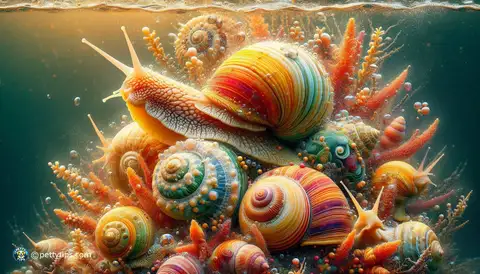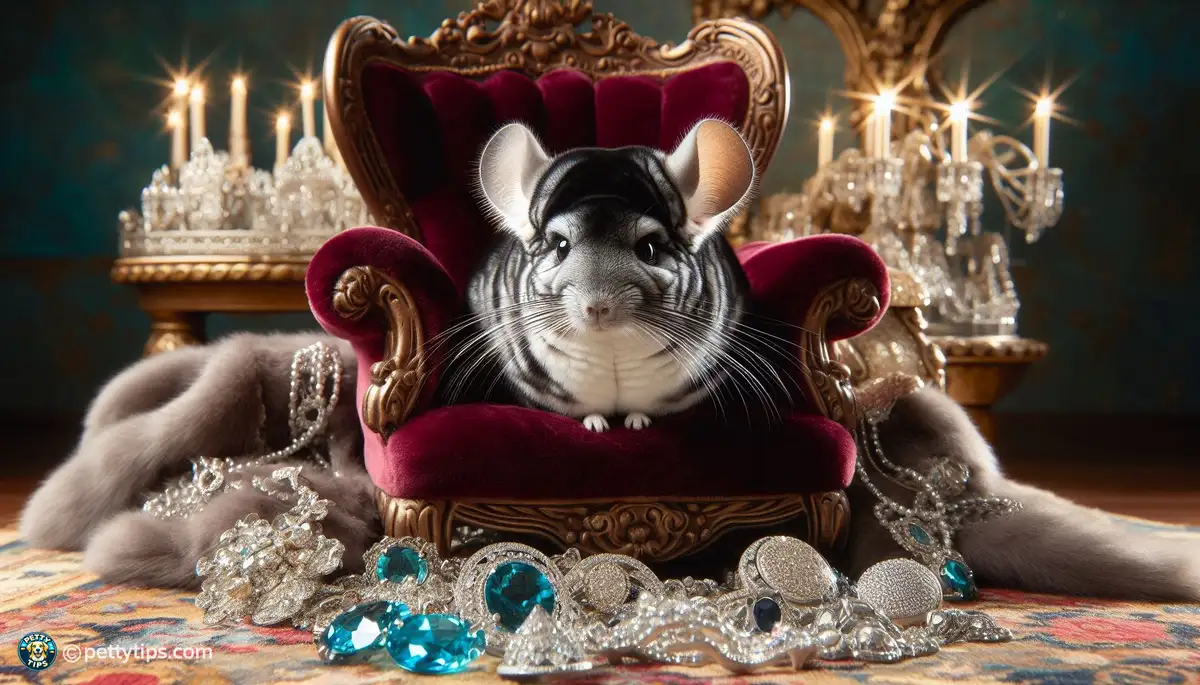
The Fascinating World of Freshwater Snails: A Comprehensive Guide
Martina Pérez - Oct 03, 2024 - 6 min read


Chinchillas might just be one of the most fascinating creatures to have as pets. Originating from the Andes Mountains in South America, these adorable rodents have a rich history dating back to the Inca civilization. Revered for their luxuriously soft fur, chinchillas were once on the brink of extinction due to rampant fur trading. Thankfully, conservation efforts have helped increase their numbers in captivity, making them accessible to pet owners worldwide.
One look at a chinchilla and you'll be captivated by its charm. With their large, round eyes, oversized ears, and plush fur, they exude an undeniable cuteness. Chinchillas are small mammals, typically weighing between 0.5 to 1.5 kilograms, and measuring around 9 to 15 inches in length. Their fur, which comes in various shades of gray, white, beige, and black, is incredibly dense, with over 50 hairs per follicle, making it one of the softest in the animal kingdom.
Despite their diminutive size, chinchillas possess larger-than-life personalities. They are known for their curious and playful nature, often engaging in acrobatic feats and exploring their surroundings with boundless energy. Chinchillas are social creatures that thrive on companionship, so it's advisable to keep them in pairs or small groups. While they may be a bit shy at first, with patience and gentle handling, they can form strong bonds with their human caregivers, displaying affection through gentle nibbles and soft chirps.
Creating a suitable living environment is crucial for the health and well-being of your chinchilla. When selecting a cage, opt for one that provides ample space for exercise and exploration. Wire cages with multiple levels are ideal, as they allow chinchillas to climb and jump, mimicking their natural habitat. Ensure that the spacing between the wires is narrow to prevent any accidental escapes or injuries.
Inside the cage, provide a soft and absorbent bedding material, such as aspen shavings or paper-based bedding, to keep your chinchilla comfortable and dry. Additionally, incorporate plenty of enrichment items, such as wooden chew toys, tunnels, and platforms, to stimulate their minds and prevent boredom. Chinchillas love to gnaw on objects to keep their teeth healthy, so offering safe chew toys is essential to prevent dental issues.
Chinchillas are highly sensitive to heat and humidity, so it's crucial to maintain a cool and dry environment in their living space. Keep the temperature between 60 to 70 degrees Fahrenheit and avoid exposing them to direct sunlight or drafts. Installing a thermometer and hygrometer in the cage can help you monitor conditions and make necessary adjustments to ensure your chinchilla stays happy and healthy.
A well-balanced diet is essential for the overall health and longevity of your chinchilla. Provide a combination of high-quality pellets, fresh hay, and limited amounts of fresh vegetables and fruits as treats. Pellets should make up the bulk of their diet, with hay available at all times to aid digestion and wear down their continuously growing teeth.
While chinchillas obtain most of their moisture from their food, it's still important to provide access to fresh water at all times. Use a water bottle attached to the side of the cage to prevent spills and contamination. Change the water daily and clean the bottle thoroughly to ensure it remains free of bacteria and algae.
Certain foods can be harmful or even fatal to chinchillas if ingested. Avoid feeding them anything high in sugar, fat, or salt, as well as toxic plants such as avocado, chocolate, and onions. Stick to chinchilla-specific pellets and safe, fresh produce to keep your furry friend healthy and happy.
Just like any other pet, chinchillas require routine veterinary care to monitor their health and catch any potential issues early on. Schedule annual checkups with a veterinarian experienced in exotic pets to ensure your chinchilla remains in optimal condition. Be vigilant for signs of illness, such as decreased appetite, lethargy, and changes in behavior, and seek medical attention promptly if you notice any abnormalities.
Chinchillas have continuously growing teeth that need regular maintenance to prevent overgrowth and dental problems. Provide plenty of chew toys and wooden blocks for them to gnaw on, which helps wear down their teeth naturally. Additionally, monitor their teeth regularly for signs of malocclusion or other dental issues, and consult with your veterinarian if you notice any abnormalities.
Chinchillas are meticulous groomers and will often bathe themselves in dust to keep their fur clean and healthy. Provide a dust bath made from chinchilla-specific dust or volcanic ash a few times a week, allowing them to roll and frolic in the fine particles. Avoid using water to bathe your chinchilla, as their dense fur takes a long time to dry and can lead to skin problems if not properly dried.
building trust and rapport with your chinchilla is essential for a harmonious relationship. Approach them slowly and calmly, using a gentle touch to avoid startling or stressing them. Support their body with both hands when lifting or carrying them to prevent injury, as chinchillas have delicate bones and can easily become injured if mishandled.
Spending quality time with your chinchilla is crucial for strengthening your bond and fostering a sense of companionship. Engage in interactive play sessions, offering treats and praise as rewards for good behavior. Allow your chinchilla to explore outside of their cage in a safe and supervised environment, providing opportunities for enrichment and socialization.
While chinchillas can be affectionate and sociable, they also value their personal space. Pay attention to their body language and cues, respecting their boundaries and avoiding interactions when they're not in the mood. Over time, you'll develop a deeper understanding of your chinchilla's preferences and personality, strengthening the bond between you.
One of the most common health issues in chinchillas is overgrown teeth, which can lead to pain, difficulty eating, and other complications. Provide plenty of chew toys and monitor their dental health regularly to prevent overgrowth. In severe cases, your veterinarian may need to trim their teeth under sedation to restore proper alignment and function.
Some chinchillas develop a habit of chewing on their fur, which can lead to bald patches and skin irritation. This behavior is often a sign of stress or boredom, so it's essential to identify and address the underlying cause. Provide plenty of enrichment, social interaction, and mental stimulation to keep your chinchilla engaged and content.
Chinchillas are prone to respiratory infections, especially in environments with poor air quality or high levels of dust and ammonia. Keep their living space clean and well-ventilated, using dust-free bedding and avoiding exposure to smoke or strong odors. If you notice signs of respiratory distress, such as wheezing or labored breathing, seek veterinary attention immediately.